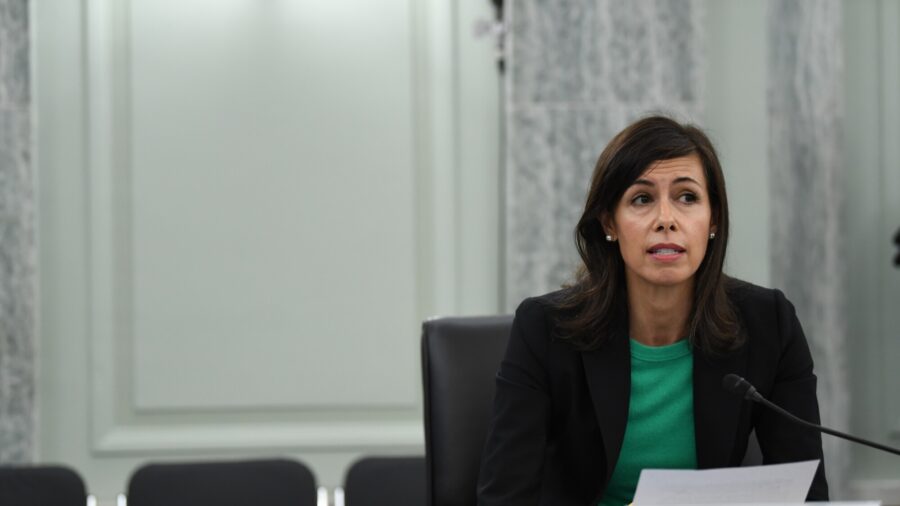Federal Communications Commission (FCC) Chairwoman Jessica Rosenworcel proposed, on Tuesday, that the commission reinstate Obama-era “net neutrality” rules that required internet service providers (ISPs) to service all internet traffic equally regardless of the content of the web traffic.
The net neutrality rules were implemented by the Obama-era FCC and repealed by the Trump-era FCC. Ms. Rosenworcel proposed reinstating the “net neutrality” rules during remarks at the National Press Club on Tuesday.
Ms. Rosenworcel, who President Barack Obama initially appointed to the FCC in 2011 and who President Joe Biden appointed as FCC chair in 2021, cast the Trump-era decision to repeal the net neutrality rules as a blow to prior efforts to make the internet “open and fair.”
“I believe this repeal of net neutrality put the FCC on the wrong side of history, the wrong side of the law, and the wrong side of the American public,” she said. “It was not good then, and it makes even less sense now.”
The FCC is composed of five commissioners, who are appointed to the commission by the president and serve a five-year term. Ms. Rosenworcel called for reviving the Obama-era net neutrality rules just one day after FCC Commissioner Anna Gomez joined the commission, giving Democrats five appointees on the five-member panel.
Like other proponents of “net neutrality,” Ms. Rosenworcel argued that the rules would compel ISPs to process all internet traffic at consistent rates across the board, preventing those ISPs from favoring certain websites while throttling others. In her Tuesday remarks, Ms. Rosenworcel argued that the COVID-19 pandemic highlighted the need for ensuring fair access to the internet because many Americans were forced to either work from home or attend classes online.
Ms. Rosenworcel said the FCC would soon introduce for consideration a net neutrality policy that will bar ISPs from “unreasonably interfering or unreasonably disadvantaging consumers from going where they want and doing what they want on the internet.”
Opponents: Not All Internet Traffic Is Equal
While proponents of net neutrality rules argue that they ensure ISPs don’t unfairly benefit some internet traffic while disadvantaging others, opponents of the rules argue that it’s necessary for ISPs to draw distinctions between different types of internet traffic. Under net neutrality rules, online activity that requires a higher bandwidth like video streaming would be treated the same as lower bandwidth activity despite being more resource-intensive for ISPs.
“Netflix, Amazon, and the rest don’t want ISPs to charge either them or their consumers for their high-bandwidth content,” Jeffrey A. Tucker wrote in a 2017 article for the Foundation for Economic Freedom. “They would rather the ISPs themselves absorb the higher costs of such provision. It’s very clear how getting the government to make price discrimination illegal is in their interest. It means no threats to their business model.”
Mr. Tucker argued that net neutrality for the internet would be akin to forcing a commercial shipping service to treat all of its shipments the same regardless of the size of the items that need to be delivered.
“Let’s imagine that a retailer furniture company were in a position to offload all their shipping costs to the trucking industry,” Mr. Tucker’s 2017 opinion reads. “By government decree, the truckers were not permitted to charge any more or less whether they were shipping one chair or a whole houseful of furniture. Would the furniture sellers favor such a deal? Absolutely. They could call this ‘furniture neutrality’ and fob it off on the public as preventing control of furniture by the shipping industry.”
Mr. Tucker argued that larger incumbent ISPs like Comcast and Verizon might favor net neutrality rules because while these rules might prove costly for providing internet services, they could prove too costly for smaller competitor ISPs.
“For established firms, a rule like net neutrality can raise the costs of doing business, but there is a wonderful upside to this: your future potential competitors face the same costs. You are in a much better position to absorb higher costs than those barking at your heels,” he wrote.
Ms. Rosenworcel said the FCC will publish its proposed net neutrality rules on Thursday, Sept. 28, for public comment.


